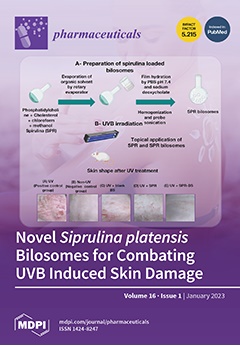Ver ítem
- xmlui.general.dspace_homeCentros e Institutos de InvestigaciónCIRN. Centro de Investigaciones de Recursos NaturalesInstituto de Recursos BiológicosArtículos científicosxmlui.ArtifactBrowser.ItemViewer.trail
- Inicio
- Centros e Institutos de Investigación
- CIRN. Centro de Investigaciones de Recursos Naturales
- Instituto de Recursos Biológicos
- Artículos científicos
- Ver ítem
Biological evaluation of Valeriana extracts from Argentina with potent cholinesterase inhibition for the treatment of neurodegenerative disorders and their comorbidities the case of Valeriana carnosa Sm. (Caprifoliaceae) studied in mice
Resumen
Alzheimer’s disease (AD) is a neurodegenerative disorder whose pathophysiology in cludes the abnormal accumulation of proteins (e.g., β-amyloid), oxidative stress, and alterations in neurotransmitter levels, mainly acetylcholine. Here we present a comparative study of the ef fect of extracts obtained from endemic Argentinian species of valerians, namely V. carnosa Sm., V. clarionifolia Phil. and V. macrorhiza Poepp. ex DC from Patagonia and V. ferax
[ver mas...]
Alzheimer’s disease (AD) is a neurodegenerative disorder whose pathophysiology in cludes the abnormal accumulation of proteins (e.g., β-amyloid), oxidative stress, and alterations in neurotransmitter levels, mainly acetylcholine. Here we present a comparative study of the ef fect of extracts obtained from endemic Argentinian species of valerians, namely V. carnosa Sm., V. clarionifolia Phil. and V. macrorhiza Poepp. ex DC from Patagonia and V. ferax (Griseb.) Höck and V. effusa Griseb., on different AD-related biological targets. Of these anxiolytic, sedative and sleep-inducing valerians, V. carnosa proved the most promising and was assayed in vivo. All valerians inhibited acetylcholinesterase (IC50 between 1.08–12.69 mg/mL) and butyrylcholinesterase (IC50 between 0.0019–1.46 mg/mL). They also inhibited the aggregation of β-amyloid peptide, were able to chelate Fe2+ ions, and exhibited a direct relationship between antioxidant capacity and phenolic content. Moreover, V. carnosa was able to inhibit human monoamine oxidase A (IC50: 0.286 mg/mL (0.213–0.384)). A daily intake of aqueous V. carnosa extract by male Swiss mice (50 and 150 mg/kg/day) resulted in anxiolytic and antidepressant-like behavior and improved spatial memory. In addition, decreased AChE activity and oxidative stress markers were observed in treated mouse brains. Our studies contribute to the development of indigenous herbal medicines as therapeutic agents for AD.
[Cerrar]

Autor
Marcucci, Carolina;
Rademacher, Marina;
Kamecki, Fabiola;
Pastore, Velentina;
Bach, Hernán Gerónimo;
Ricco, Rafael Alejandro;
Wagner, Marcelo Luis;
Knez, Damijan;
Gobec, Stanislav;
Colettis, Natalia;
Mander, Mariel;
Fuente
Pharmaceuticals 16 (1) : 129 (January 2023)
Fecha
2023-01-01
Editorial
MDPI
ISSN
1424-8247
Formato
pdf
Tipo de documento
artículo
Palabras Claves
Derechos de acceso
Abierto
 Excepto donde se diga explicitamente, este item se publica bajo la siguiente descripción: Creative Commons Attribution-NonCommercial-ShareAlike 2.5 Unported (CC BY-NC-SA 2.5)
Excepto donde se diga explicitamente, este item se publica bajo la siguiente descripción: Creative Commons Attribution-NonCommercial-ShareAlike 2.5 Unported (CC BY-NC-SA 2.5)


